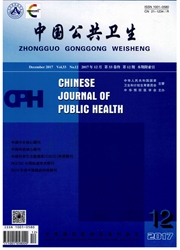

 中文摘要:
中文摘要:
目的研究过量碘致甲状腺自体免疫性疾病的作用机制。方法建立高碘性甲状腺自体免疫性疾病模型,在分析T3、T4,促甲状腺激素(TSH),促甲状腺激素受体抗体(TSHRAb)变化和甲状腺病理改变的基础上,检测促甲状腺激素受体(TSHR)mRNA表达水平的改变,观察树突状细胞(DC)抗原递呈功能的变化。结果饲喂过量碘3个月的小鼠出现了以体液免疫为主的甲状腺自体免疫性疾病的相关指征,小鼠TSHRmRNA表达水平升高,DC共刺激分子CD80、CD86表达水平、DC细胞上特征表达标志CD11c表达水平、DC细胞表面抗原组织相容性复合物Ⅱ类分子(MHC-Ⅱ)表达水平皆升高,与对照组比较差异有统计学意义(P〈0.05,P〈0.01)。结论过量碘使TSHR竞争反应加强,DC抗原递呈功能增强,导致机体产生以体液免疫为主的甲状腺自身免疫反应。
 英文摘要:
英文摘要:
Objective To investigate immune mechanism of autoimmune thyroid disease (AITD) caused by excessive iodine. Methods High iodine thyroid autoimmune disease model was established to detect the changes of expression level of thyroid stimulating hormone acceptor (TSHR) mRNA and the antigen-presenting function of dendritic cell (DC) based on the analysis of the changes of T3, T4, TSH, TSHRAb and thyroid pathology. Results Indications of AITD were observed among the mice with excessive iodine feeding for three months. The expression levels of TSHR mRNA, CD80, CD86-co- stimulatory molecules of DC,CD11 c-the symbol of characteristic expression in DC,MHC-Ⅱ molecules-the antigen istocompatibility complex in the surface of DC were significanct higher than those of normal control group. Conclusion Excessive iodine strengthen the competitive reaction of TSHR, antigen-presenting function of DC, and leads mainly to humoral immune thyroid autoimmunity.
 同期刊论文项目
同期刊论文项目
 同项目期刊论文
同项目期刊论文
 期刊信息
期刊信息
